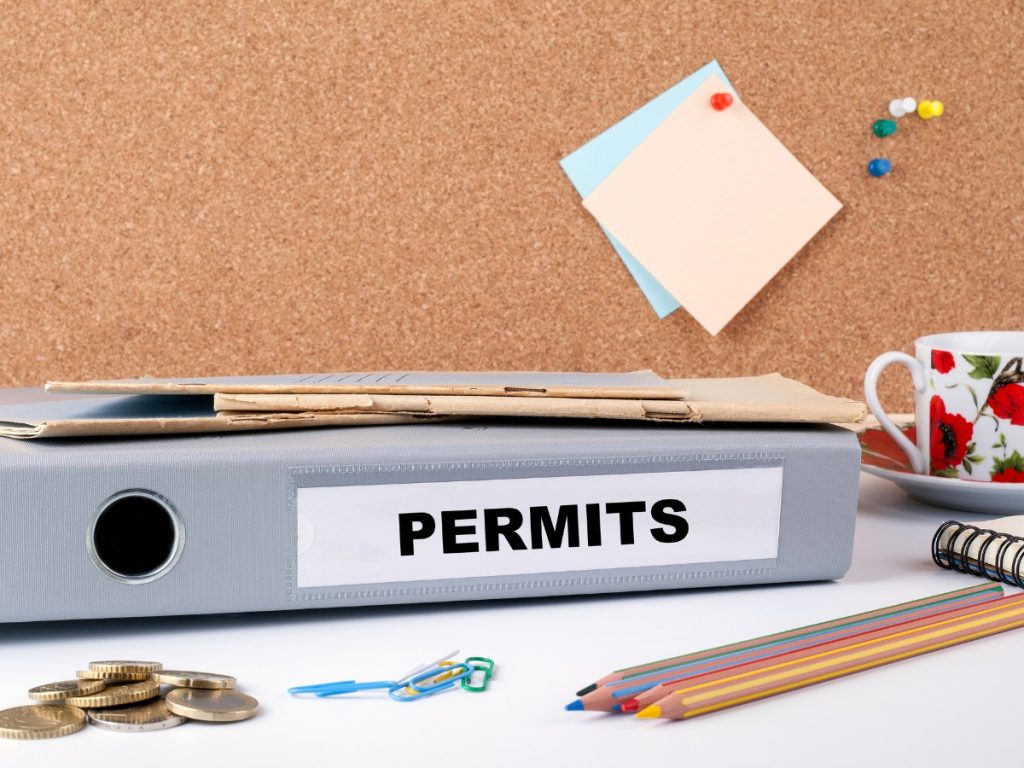With the rising cost of homes and the desire for more space, many homeowners consider room additions a viable solution. However, before embarking on a room addition project, it is essential to understand the role of permits in the process.
Permits ensure the structural integrity of new construction, have legal implications, and impact homeowners’ insurance. In this blog, we will explore the importance of room addition permits, the role of zoning, the types of permits required, cost considerations, how to secure permits, the consequences of building without permits, and address common queries about room addition permits.
Why Room Addition Permits Matter
Room addition permits ensure the occupants’ safety and the structure’s integrity. By obtaining the necessary permits, homeowners can rest assured knowing that the new construction meets the required building standards and code requirements. Unpermitted work poses safety risks without permits as it may not adhere to structural, electrical, and plumbing codes.
In addition to safety considerations, room addition permits have legal implications. Engaging in unpermitted construction can lead to potential consequences for homeowners. Building officials have the authority to issue stop-work orders, levy fines, or even require the removal of unpermitted work. Moreover, building without permits can impact the sale of your home, as potential buyers may be hesitant to purchase a property with unpermitted additions.
Furthermore, unpermitted room addition work may affect homeowner’s insurance. In the event of property damage or accidents, insurance companies may deny claims if the work was done without the necessary permits. It is essential to consult with your insurance provider to understand the implications and potential gaps in coverage associated with unpermitted projects.
The Role of Zoning in Room Additions
When planning a room addition project, it is crucial to consider the role of zoning regulations. Zoning laws dictate how land can be used and what structures are permitted on a property. They vary from city to city, so it is essential to familiarize yourself with the local zoning requirements before undertaking any construction.
Zoning considerations impact the size, location, and design of your room addition. Some zones may have restrictions on the square footage of the addition, setback requirements, or limitations on the structure’s height. Complying with your city’s specific zoning laws is necessary for obtaining permits and ensures that your room addition aligns with the surrounding neighborhood.
Understanding the local building codes, often based on the International Building Code (IBC), is also vital. Building codes establish the minimum requirements for construction projects, including structural, electrical, plumbing, and mechanical aspects. When applying for room addition permits, these codes serve as the benchmark for plan review and inspection processes to ensure the safety and functionality of the new addition.
Types of Permits Required for Room Additions
Now, let’s delve into the permits required for room addition projects. Depending on the project’s scope, various permits may be necessary to ensure compliance with building codes and regulations. Here are the two primary permits typically required for room additions:
Plan Review Permit
A plan review permit is the first step in the permit process for room additions. This permit involves thoroughly examining the construction plans by the local building department. The plan review ensures that the room addition project meets the necessary building codes and requirements.
To obtain a plan review permit, homeowners must submit detailed construction plans, including architectural, structural, electrical, and plumbing drawings. The plans should demonstrate compliance with the applicable building codes, zoning regulations, and fire safety requirements.
Once the plans are submitted, the local building department reviews them for code compliance, structural integrity, and adherence to local regulations. Upon approval, the plan review permit is issued, indicating that the project complies with the necessary building codes and can proceed to the following stages of construction.
Post-Construction Inspection Permit
The post-construction inspection permit is the final permit required for room additions. This permit involves a comprehensive inspection of the completed construction by a building inspector from the local building department. The inspector examines the room addition to ensure it meets the approved construction plans and complies with the necessary building codes.
The final inspection is crucial, as it validates the structural integrity, electrical work, plumbing, and overall safety of the room addition. If the inspector finds any deficiencies or code violations, the homeowner may be required to make necessary corrections before issuing the permit.
Obtaining the post-construction inspection permit signifies that the room addition has been completed according to the approved plans, building codes, and local regulations. This permit is essential for the homeowner, as it documents the project’s compliance, which may be required for insurance, the sale of the property, or future renovations.

Cost Considerations for Room Addition Permits
Cost considerations play a significant role when planning a room addition, and permits are part of the overall project cost. The cost of room addition permits may vary depending on the jurisdiction and the project’s total construction costs.
Estimating the Cost of Permits
Estimating the cost of permits for room additions involves considering the scope of the project and the total construction costs. Permit fees are typically based on the value of the construction work, square footage, or the type of room addition. Each permit required, such as plan review permits, inspection permits, electrical permits, and plumbing permits, may have separate fees.
The total value of permits required for room additions impacts the property tax valuation, as property taxes are often assessed based on the total construction value. It is essential to accurately estimate the cost of permits, as they are a necessary expense when planning your room addition project.
The Impact of Construction Costs on Permit Prices
The cost of permits for room additions is directly related to the project’s total construction costs. More considerable room additions or those involving extensive structural changes, electrical work, or plumbing installations may require more permits, resulting in higher permit prices.
Additionally, the square footage of the room addition influences the cost of permits, as more significant projects may require additional inspections or plan review processes. It is crucial to factor in the construction costs when estimating the total project budget, including permit expenses, to ensure a smooth and compliant room addition process.
How to Secure a Room Addition Permit
Now that we understand the importance of room addition permits and their associated costs, let’s explore the process of securing them. Following the necessary steps and requirements is crucial to ensure a successful permit application.
Steps to Obtain a Permit
- Research the local building codes and permit requirements for your room addition project.
- Prepare the necessary documents, including detailed construction plans and permit application forms.
- Submit the permit application, along with the construction plans, to the local building department.
- Wait for the plan approval, which involves building officials reviewing and examining the construction plans.
- Upon plan approval, the building inspector will conduct the final inspection to ensure the room addition meets the necessary codes and requirements.
- Hiring a licensed contractor or construction professional experienced in the permitting process is essential to navigate the complexities of securing room addition permits. They can assist with the application, ensure code compliance, and guide the process.
Understanding Permit Requirements
Understanding the permit requirements for your room addition project is crucial to ensure a smooth permit application process. Familiarize yourself with the local building codes, permit application forms, and any additional requirements specific to your city or jurisdiction.
Ensure that your room addition plans comply with the necessary building codes, zoning regulations, fire safety requirements, structural integrity, electrical work, plumbing, and other relevant aspects of construction. Consulting with experts and seeking free consultation on necessary building permits can provide valuable insights and assist in completing the permit application process.
The Consequences of Building Without a Permit
Building without permits can have significant consequences for homeowners during and after the construction process, so it is crucial to adhere to the necessary permit requirements.
Safety Risks and Legal Implications
Undertaking unpermitted work poses safety risks, as the construction may need to meet the required building standards, electrical codes, or plumbing regulations. Unpermitted projects may involve faulty construction, substandard materials, or improper structural changes, potentially endangering the occupants and the property’s existing structure.
From a legal standpoint, building without permits can lead to potential consequences, such as stop work orders, code violations, or even potential fines. Furthermore, unpermitted work may pose challenges when selling your home, as buyers typically conduct thorough inspections. Unpermitted additions may deter potential buyers due to uncertainties surrounding the construction quality and compliance with building codes.
Impact on Property Value and Resale Potential
Unpermitted room addition projects can significantly impact your home’s property value and resale potential. Assessors, appraisers, and potential buyers consider the construction’s quality and compliance.
Unpermitted work can lead to issues during the sale of the property, as buyers may request the necessary permits or ask for a price reduction due to the uncertain nature of the construction. Additionally, unpermitted room additions may not be factored into property tax assessments, potentially leading to discrepancies in property value and taxes paid. It is essential to obtain the necessary permits for room addition projects to ensure your home’s structural integrity, safety, and value.
Remember, cutting corners and building without a permit can lead to safety risks and legal implications and even impact the resale value of your property. So, take the time to understand the permit requirements, estimate the cost, and secure the necessary permits before starting your room addition project. With the right permits, you can proceed confidently and enjoy the benefits of your new and improved space.

